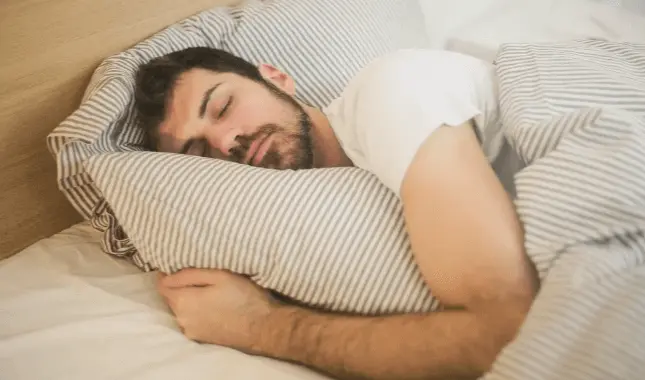As we start, The first important thing that we need to address during weight loss is sleep is an important factor that many people and trainers tend to overlook and might be the key reason you are not losing weight even after following a very hard training and dieting program.
It is very important to get 7 hours of sleep every day. Researchers have found that sleeping for less than 5 hours can increase the risk of gaining weight and most of it being belly fat. It has been found that sleep deprivation has been linked to weight gain and it is one of the leading factors as to why you are not losing weight in the first place.

Melatonin is a hormone that is crucial for a good night’s sleep as optimum levels of it can induce sleep, it has been called the sleep hormone. It boosts metabolism and helps improve the process of fat burning and tends to prevent insulin resistance. With a bad night’s sleep, the body tends to slow the metabolic rate which causes decreased burning of fat.
Reasons why less sleep or the lower quality of sleep can cause you to gain weight
- Firstly low sleep quality and hours can cause the hunger hormone (ghrelin) levels to be raised in the blood which indirectly causes an increase in appetite.
- There is a decrease in the appetite regulation hormone called leptin which is released from the fat cells and plays a main factor in making you feel full and this is reduced due to sleeplessness.
Research has found that men who had 4 hours of sleep had increased ghrelin and decreased leptin levels as compared to men with 10 hours of sleep.
- Some researchers have found that a few areas of the brain that are usually responsible for rewards are more active in case of less sleep during the night.
Sleep deprivations have been indicated to show a change in food preferences causing sleep-deprived people to choose foods higher in calories.
- Insulin is also known to regulate blood glucose levels and plays a key role in storing glycogen as fat cells under tissues, When the body has a high amount of glucose circulating in the blood it becomes less responsive causing all the extra glucose to be converted to glycogen and then stored as fat. Sleeplessness increases the risk of insulin tolerance.
- Sleeplessness immensely decreases your willpower and it requires you to have a feel-good factor to continue about with the rest of the day and may cause impulsive eating behavior and thus you being unable to stop yourself from that extra slice of pizza.

- Sleeplessness increases stress hormones as it hurts the sympathetic nervous system, Which stops weight loss and adds to your weight causing increased belly fat. It is also very important to be stress-free to cause the release of melanin into your bloodstream and this is a cycle that is hard to get out of.
- Staying up late can increase the chance of snacking during the night as sleeping late increases the window of time for eating, you usually tend to consume calorie-rich junk food on top of the fact that during the night your body’s metabolism is reduced ultimately adding to your weight.
A study has shown that people with sleep deprivation tend to consume an additional 300 calories to 400 calories per day with the majority of these calories being fat food.
- A study has shown that sleeplessness decreases muscle protein synthesis by about 20%.
- The most obvious fact is that you are going to avoid exercising the next day as you are too tired. it also increases muscle fatigue, and sleep is bound in an endless loop with physical activity as reduced sleep time and quality can cause decreased physical activity the next day, and decreased physical activity, in turn, causes less sleep.
Lack of sleep greatly affects your athletic performance, it negatively impacts your reaction time, motor skills, muscle power, endurance, and problem-solving skills.
- It becomes hard for you to resist food as your brain becomes slower due to insufficient rest. It is similar to being drunk as you are unable to make rational decisions.
In children and young adults, there was a direct link between sleeplessness and obesity due to metabolic irregularities, skipping breakfast in the morning due to sleeplessness has also shown to be a leading factor for weight gain.

Moreover, sleeping disorders like sleep apnea gets worse with weight gain and this causes you to fall into a cycle of poor sleep causing weight gain and weight gain leading to poor sleep. Sleep deprivation has shown increased smell sensitivity to high-calorie foods causing greater consumption.
One research has also shown in men that testosterone levels have decreased by 1/4th of their original value due to sleep deprivation.
How to sleep better
Most people need to sleep for 7 to 9 hours a day To get a good night’s sleep As we know our body has an internal clock known as the circadian rhythm that helps release hormones from the brain and let it know when it is time to sleep, natural light/sunlight keeps your internal clock healthy in contrary the light emitted from gadgets known as the blue light disturbs your clock.
Exercising regularly is considered the best way to deal with insomnia, it is found to enhance all aspects of sleep. It has been shown to offer more advantages as compared to multiple drugs that have been used instead.
It is really important to stay away from screens as they emit blue light and it disturbs the production of melanin in your body, stop using gadgets for at least 3 hours before you go to bed and instead read a book which will automatically tire your brain out causing you to sleep.
Taking irregular and long naps during the day can also have a negative impact, sleeping during the day get your internal clock confused and thus making it harder for you to sleep during the night, but other studies have shown that taking naps for about 30 minutes can have benefits like energizing you and improve brain function.
It is also important to avoid caffeinated substances like coffee after lunchtime as the effect of it can last anywhere from 10 to 12 hours. Taking a short walk during the day for 20 minutes has been shown to improve sleep duration and the quality of sleep during the night.
It is also safe to avoid coffee as it tends to raise blood pressure during the night. Sticking to a midnight ritual can eventually start self-induction of sleep when you are doing that particular thing as it tricks your brain into thinking that it is time to sleep even if you are not sleepy. Sticking to a schedule helps, waking up and going back to sleep at a particular time. It also helps your internal clock to adjust to the sunset and sunrise time.
Avoiding alcohol is the way to go as having a couple of drinks can negatively impact your sleep, and alcohol is very well known for causing sleep apnea, snoring, and disturbed sleep patterns. It also has been shown to alter melatonin production during the night thus causing sleeplessness.
Another great piece of advice you can follow is to set an optimal bedroom temperature as it greatly affects sleep quality. It has been proved in a study that bedroom temperature affected sleep quality more as compared to external noises.
Devoid yourself from eating late in the evening as it can affect both your sleep quality and Human growth hormone and release into the blood, eating a low carbohydrate diet at dinner has shown to improve sleep, and you should eat your meal 4 hours before your bedtime to help you sleep better and faster.
Relaxing has to be a part of your pre-sleep routine as relaxation shows improved sleep quality, and a massage before sleep has shown to be beneficial. A relaxing shower 1 to 2 hours before sleeping also helps with sleeplessness.
As obvious as it sounds it is crucial to have a comfortable bed, pillow, and mattress as these can help reduce pressure on the back and the neck and help sleep better.
Lastly, turn off the lights as darkness causes the release of the sleep hormone melatonin to be released while having the light turned on in the bedroom tends to suppress it. Another way is to take melatonin supplements which have become popular among sleep-deprived people, It is advised to start with a low dose.
Other supplements like ginkgo Biloba, glycine, and magnesium can also be used.
Conclusion
If you are trying to lose weight not getting enough sleep can hamper many if not all of your efforts, A lack of sleep is directly related to bad food choices, higher intake of calories, higher risks of intake of unhealthy food, a decreased in physical activity, binge eating and decreased hormones in the body which can ultimately cause weight gain.
